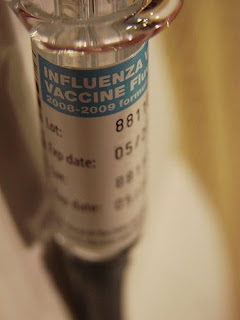Should You Get A Flu Shot?
 It's that time of year when messages abound that it's time to get a flu shot. The Centers for Disease Control recommends that people get vaccinated each year as early as September because the vaccination takes two weeks to become effective and flu season starts as early as October. They say that anyone who wants to reduce their chances of getting the flu should get vaccinated. They also particularly recommend that people who are at high risk of getting the flu or having complications from it get the shot:
It's that time of year when messages abound that it's time to get a flu shot. The Centers for Disease Control recommends that people get vaccinated each year as early as September because the vaccination takes two weeks to become effective and flu season starts as early as October. They say that anyone who wants to reduce their chances of getting the flu should get vaccinated. They also particularly recommend that people who are at high risk of getting the flu or having complications from it get the shot:Children aged 6 months up to their 19th birthday
Pregnant women
People 50 years of age and older
People of any age with certain chronic medical conditions
People who live in nursing homes and other long-term care facilities
People who live with or care for those at high risk for complications from flu, including:
a. Health care workers
b. Household contacts of persons at high risk for complications from the fluc. Household contacts and out of home caregivers of children less than 6 months of age (these children are too young to be vaccinated)
The flu shot is an inactivated virus and it is given in the arm. There is also a nasal spray vaccine, FluMist, that is made with live flu virus that the CDC says does not cause the flu.
Personally, I've always had my doubts about the flu shot. I used to get one as a teenager. One year I got the flu shot and still got the flu. I felt awful for the better part of a week and missed about the only days of high school I ever missed for being sick. And, as the CDC website says, the effectiveness of the flu shot depends on "the similarity or 'match' between the virus strains in the vaccine and those in circulation."
Flu shots are relatively inexpensive and easy to obtain. For example, at CVS Pharmacy, you can get a flu shot for $30 and you don't need an appointment. It is even possible to get flu shots at some airports - a scam if you ask me, the prays on people's fears of getting sick on the plane, because the vaccine takes 2 weeks to become effective.
But are they necessary? I'm not alone in thinking they aren't. Anne Marie Helmensteine, Ph.D., writes on About.com, "The vaccine is a sort of one-size-fits-all solution, even though there are more types of flu than covered by the vaccine and the flu types vary according to region."
Most people would gladly pay $30 to not get the flu, but the shot is far from a guarantee. And while the cost is relatively low for one person, let's say you have a family of five. The $30 flu shot now costs $150. Perhaps more importantly than the money, though, all vaccines have risks, so you might not want to get a vaccine that isn't truly necessary, especially when it might not be effective. As Health.com reports via CNN, safety studies around the flu vaccine may not be sufficient, and the flu vaccine contains a preservative that contains mercury, a known neurotoxin.
Being sick is no fun, nor is it good for your wallet, but personally, I don't think the flu shot is necessary, and I won't be getting one. I think a lot of people blindly assume that it is a good idea because it is so widely promoted, but you shouldn't believe everything you hear without doing some research on your own first. The truth is that the flu shot is not necessarily effective, may not be a good idea for your body, and the cost may not be worth it.
Photo by IamSAM.Related posts:
Why Losing Weight Is Both a Blessing and a Curse
How to Save on Eye Care
Quit Dieting, Get Healthy, and Save Money
Reducing the Time, Expense, and Hassle of Working Out
The Cost of Being Sick

Comments